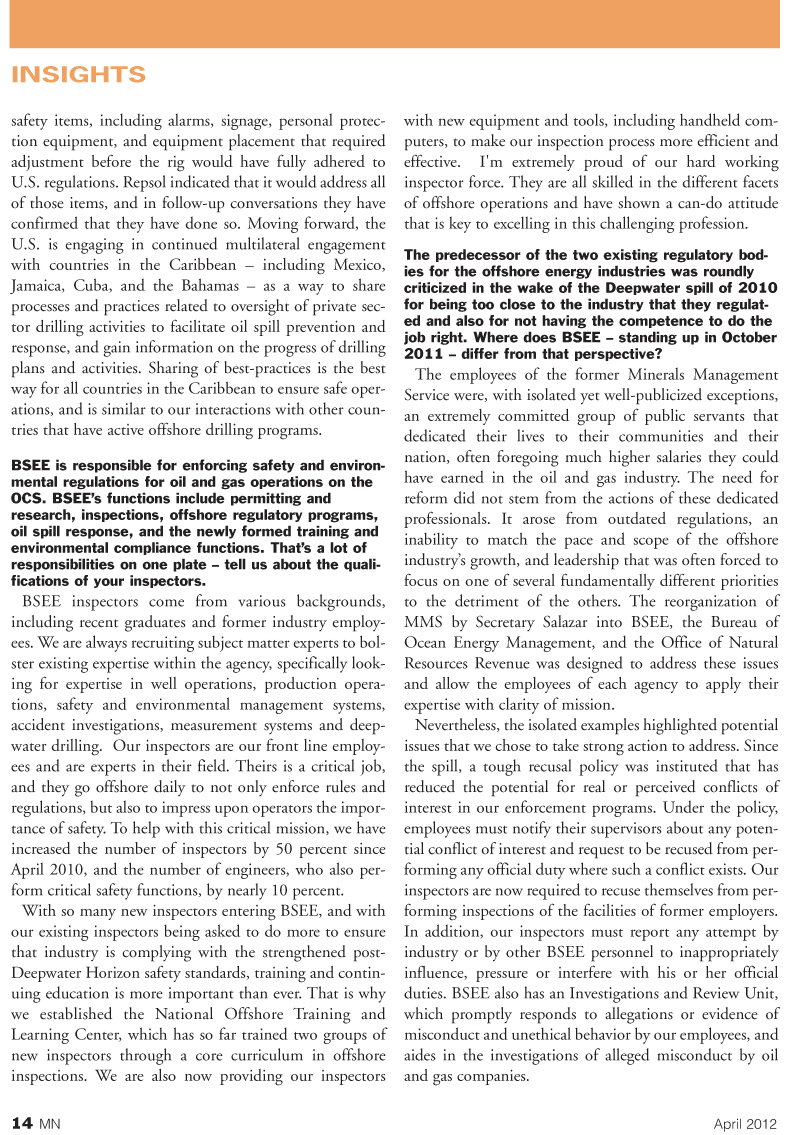
Page 14: of Marine News Magazine (April 2012)
Offshore Service Operators
Read this page in Pdf, Flash or Html5 edition of April 2012 Marine News Magazine
14MNApril 2012INSIGHTSsafety items, including alarms, signage, personal protec- tion equipment, and equipment placement that required adjustment before the rig would have fully adhered to U.S. regulations. Repsol indicated that it would address all of those items, and in follow-up conversations they have confirmed that they have done so. Moving forward, the U.S. is engaging in continued multilateral engagementwith countries in the Caribbean ? including Mexico, Jamaica, Cuba, and the Bahamas ? as a way to share processes and practices related to oversight of private sec- tor drilling activities to facilitate oil spill prevention and response, and gain information on the progress of drilling plans and activities. Sharing of best-practices is the best way for all countries in the Caribbean to ensure safe oper- ations, and is similar to our interactions with other coun-tries that have active offshore drilling programs. BSEE is responsible for enforcing safety and environ- mental regulations for oil and gas operations on the OCS. BSEEs functions include permitting and research, inspections, offshore regulatory programs, oil spill response, and the newly formed training and environmental compliance functions. Thats a lot of responsibilities on one plate ? tell us about the quali- fications of your inspectors. BSEE inspectors come from various backgrounds, including recent graduates and former industry employ- ees. We are always recruiting subject matter experts to bol- ster existing expertise within the agency, specifically look- ing for expertise in well operations, production opera- tions, safety and environmental management systems, accident investigations, measurement systems and deep- water drilling. Our inspectors are our front line employ- ees and are experts in their field. Theirs is a critical job, and they go offshore daily to not only enforce rules and regulations, but also to impress upon operators the impor- tance of safety. To help with this critical mission, we have increased the number of inspectors by 50 percent since April 2010, and the number of engineers, who also per- form critical safety functions, by nearly 10 percent. With so many new inspectors entering BSEE, and with our existing inspectors being asked to do more to ensure that industry is complying with the strengthened post- Deepwater Horizon safety standards, training and contin- uing education is more important than ever. That is why we established the National Offshore Training and Learning Center, which has so far trained two groups of new inspectors through a core curriculum in offshore inspections. We are also now providing our inspectors with new equipment and tools, including handheld com- puters, to make our inspection process more efficient and effective. I'm extremely proud of our hard working inspector force. They are all skilled in the different facets of offshore operations and have shown a can-do attitude that is key to excelling in this challenging profession. The predecessor of the two existing regulatory bod- ies for the offshore energy industries was roundly criticized in the wake of the Deepwater spill of 2010for being too close to the industry that they regulat- ed and also for not having the competence to do thejob right. Where does BSEE ? standing up in October 2011 ? differ from that perspective? The employees of the former Minerals Management Service were, with isolated yet well-publicized exceptions, an extremely committed group of public servants that dedicated their lives to their communities and their nation, often foregoing much higher salaries they could have earned in the oil and gas industry. The need for reform did not stem from the actions of these dedicated professionals. It arose from outdated regulations, an inability to match the pace and scope of the offshore industrys growth, and leadership that was often forced to focus on one of several fundamentally different priorities to the detriment of the others. The reorganization of MMS by Secretary Salazar into BSEE, the Bureau of Ocean Energy Management, and the Office of Natural Resources Revenue was designed to address these issues and allow the employees of each agency to apply their expertise with clarity of mission. Nevertheless, the isolated examples highlighted potential issues that we chose to take strong action to address. Since the spill, a tough recusal policy was instituted that has reduced the potential for real or perceived conflicts of interest in our enforcement programs. Under the policy, employees must notify their supervisors about any poten- tial conflict of interest and request to be recused from per- forming any official duty where such a conflict exists. Our inspectors are now required to recuse themselves from per- forming inspections of the facilities of former employers. In addition, our inspectors must report any attempt by industry or by other BSEE personnel to inappropriately influence, pressure or interfere with his or her official duties. BSEE also has an Investigations and Review Unit, which promptly responds to allegations or evidence of misconduct and unethical behavior by our employees, and aides in the investigations of alleged misconduct by oil and gas companies.

 13
13

 15
15
